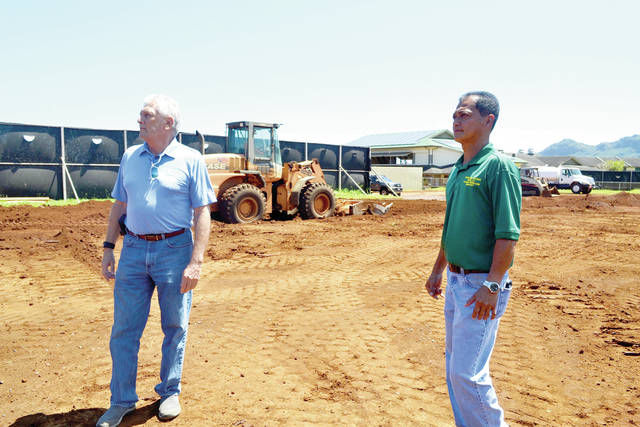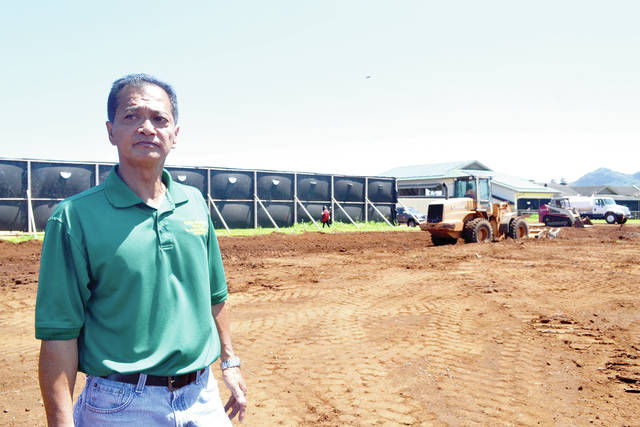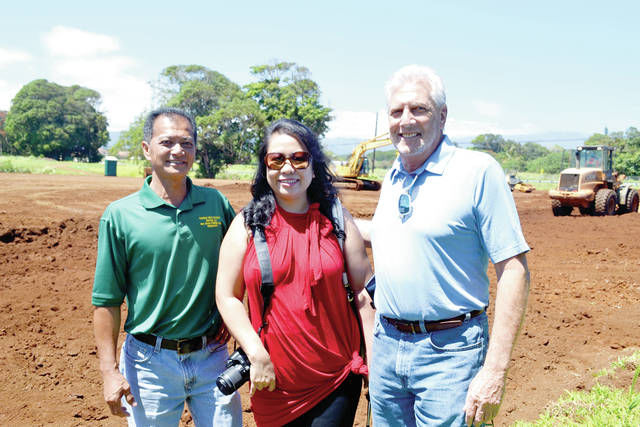LIHUE — With very little money in his pocket, Lesther Calipjo moved to Kauai in 1985 from the Philippines. At 23, he had two full-time jobs and a family to support. He said he wished there would have been a
LIHUE — With very little money in his pocket, Lesther Calipjo moved to Kauai in 1985 from the Philippines.
At 23, he had two full-time jobs and a family to support.
He said he wished there would have been a place for immigrants like him, from all cultures, to congregate and have a smoother transition to Kauai.
“Our goal is for the kids and the younger generation to come in help us out to build this cultural center,” said Calipjo, president of the Kauai Philippine Cultural Center. “This is not only for the Filipinos. This is for everybody else on Kauai. It’s a place for all.”
Phase one of construction of the Kauai Philippine Cultural Center started in January, according to board members.
“As soon as we’re done with the side work, we need to start planning for the building,” Calipjo said.
Side work consists of infrastructure — waterline, sewer line and parking.
Marynel Valenzuela, KPCC financial secretary, said the inspirations for the project boiled down to having “a place for all of us to come together and have a cultural center on Kauai.”
“There’s always limited venues to hold small meetings or parties,” she said. “Back in 2010, we did this survey and we asked people what they would use this facility if we were to build it. A lot of it was we needed a more affordable venue to do small gatherings.”
Besides being a venue and having a place for kids, it’s also a place for immigrants who come to the island, said Paul Kyno, a KPCC board member.
“It’s a place to assist and help with the transition of a new place and a new life,” he said.
For Valenzuela, coming to Kauai from the Philippines at 16 was a culture shock.
“If I had a place like this back then, I probably would have felt more like I belonged,” she said. “We were young and there was no other place to go to. I went to school and I worked two jobs and kept myself busy.”
She added: “We cannot change the past, (but) we can only make our future better because of the past experiences we had.”
When completed, the project will cost around $8 million, Calipjo said.
Since its inception, the KPCC has raised $2.5 million and is seeking an additional $500,000 to complete the first phase.
“Our goal is as fast as we can,” he said. “It’s hard to get it done, but we’ll find a way to get it done.”
The cost for the second phase, which includes construction of the cultural center, hovers about $5 million.
For many years, the idea of a cultural center has been discussed, said Randall Francisco, executive director for the Kauai Filipino Chamber of Commerce.
“Lesther decided that when he was chamber president that he was gonna make that goal a reality,” he said. “For the past few years, he’s really dedicated himself to that.”
It will be a welcoming facility, he said.
“Whether you’re a Hawaiian halau or (another) group participating in cultural events, to seminars, educational, workforce training, that’s what they envisioned,” he said.
There are collaborative efforts coming from all different groups of people, Valenzuela said. The county donated three acres, while KPCC is leasing 11 acres of land from Grove Farm for $1 a year for 100 years.
The biggest challenges for KPCC have been raising money and getting enough help.
But Calipjo hopes more people will donate time and money. “If everybody gets involved with this project, it will be easier for us to get it done,” he said. “What we’re trying to do is build something for the community.”
The KPCC will host its sixth annual fundraiser on April 29 at the Kauai Marriott grand ballroom. To donate or register, visit kauaiphilippineculturalcenter.org/fundraising.




